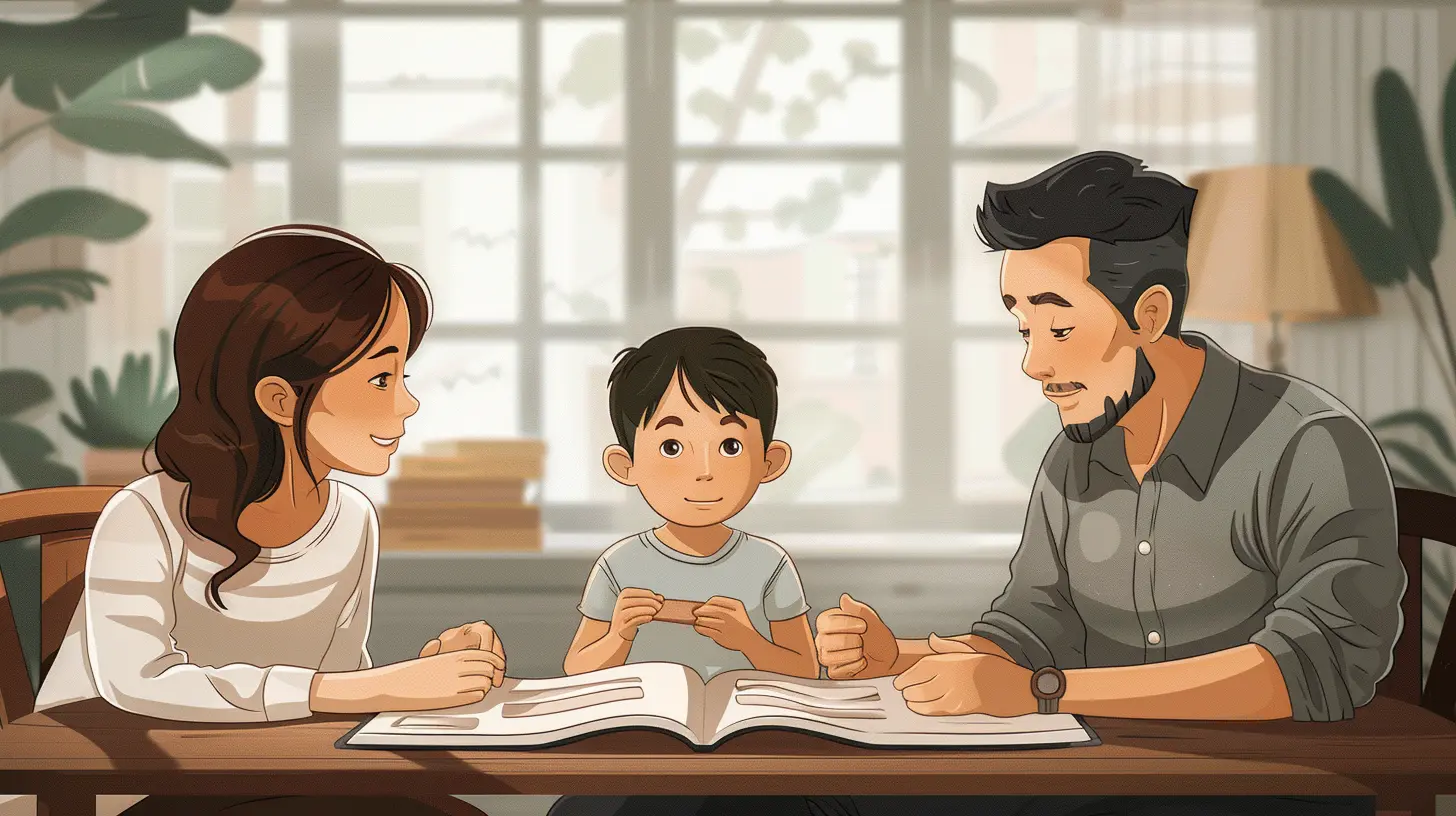The Role of Family Meetings in Managing Behavior and Discipline
7 October 2025
Let’s be honest—raising kids is both the most rewarding and the most challenging job in the world. From tantrums in the toy aisle to sibling wars over who gets the last cookie, managing behavior and discipline can sometimes feel like you’re trying to tame a tornado with a feather. That’s where family meetings can swoop in like your new parenting superpower.
You might be thinking, “Family meetings? That sounds a bit too formal for us.” But hold on—trust me, family meetings aren’t about boardroom buzzwords or power plays. They’re all about communication, connection, and cooperation. And guess what? They're actually fun (yes, really!) and incredibly effective when it comes to shaping behavior and handling discipline in a healthy, respectful way.
So let's dive deep into the role of family meetings and why they might just be the game-changer your household needs.
Why Family Meetings Matter
Think of family meetings as the glue that can keep your family's values, expectations, and relationships strong. When used right, these meetings help everyone stay on the same page—and that, my friend, is priceless when you're navigating the chaos of parenting.Encouraging Open Communication
One of the biggest benefits of family meetings is that they open the door for honest, judgment-free communication. Kids often feel like they don’t have a voice in how things are run at home. But when they’re allowed to express themselves in a structured, supportive environment, they’re more likely to cooperate and respect the rules.Fostering Responsibility and Accountability
Your child knocked over the lamp while doing somersaults in the living room—again. You can yell, or you can wait for your next family meeting to address it. When families talk openly about consequences in a calm setting, kids start to connect their actions with real-life outcomes. No yelling required.Teaching Conflict Resolution
Life’s full of disagreements. Siblings fight. Parents and kids butt heads. But family meetings provide a safe space to work through those conflicts in a way that’s constructive—not explosive. It teaches kids how to compromise, listen, and collaborate. Honestly, those are life skills they’ll thank you for later.
Setting the Stage for Success
Alright, if you’re sold on the idea, you might be wondering how to actually start. Let’s break it down.Choose the Right Time
You can't have a productive conversation when everyone’s hangry or exhausted after a long day. Pick a time when everyone's relatively happy and relaxed—maybe Sunday evening, or right after a family dinner.Keep It Consistent
This isn't a one-and-done kind of thing. For family meetings to really work, you’ve got to make them a regular event. Weekly or biweekly tends to work well. Consistency builds trust and gives your kids something to rely on.Set Simple Ground Rules
Try these to begin with:- Everyone gets a turn to speak.
- No interrupting (even if what they’re saying is so wrong).
- Speak with respect.
- Everything said stays private—this is a judgment-free zone.
These rules help keep things safe and respectful.
What to Talk About in Family Meetings
No, you don’t need an agenda fit for the United Nations. But having a rough structure helps.1. Start With the Positives
Begin each meeting by sharing something good. It can be as simple as, “I liked how Jake helped with the dishes,” or “Sophie was really patient when she had to wait her turn.” This sets a positive tone and builds confidence.2. Discuss Challenges Calmly
Now’s the time to gently address ongoing behavior issues. Is someone whining every time it’s chore time? Is screen time turning your kid into a tiny tech zombie?Bring up issues without pointing fingers. Frame it as “something our family can work on together” rather than “what you're doing wrong.”
3. Brainstorm Solutions Together
This is the magic part. Instead of laying down the law, get your kids involved in creating the rules and consequences. Ask questions like:- “What do you think is a fair consequence if someone breaks this rule?”
- “How can we all help each other remember this?”
When kids help make the rules, they’re way more likely to follow them. It’s like giving them a mini badge of responsibility.
4. Plan Fun Stuff, Too
Not every meeting has to be about problems. Throw in some fun topics:- Where should we go for our next family day?
- What should our next movie night be?
- Any fun dinner themes we want to try?
This keeps things light and reminds your kids that family meetings aren’t punishments—they're also celebrations.
Family Meetings and Discipline: A New Approach
Let’s face it—discipline often gets a bad rap. It’s not about punishment; it’s about teaching. And family meetings can shift the discipline dynamic from reactive to proactive.Moving Away from Punishment
Family meetings help move discipline away from traditional punishment (like taking away screens for a week) toward meaningful consequences that teach responsibility.For example, instead of grounding your child for arguing with a sibling, use the meeting to talk about why it's important to treat each other kindly. Then decide together what a fair consequence might be—like writing a note of apology or doing something kind for the person they hurt.
Modeling Emotional Intelligence
When you stay calm and collected during family meetings—even when discussing tough stuff—you’re showing your kids how to regulate emotions and handle conflict like a pro. That’s emotional intelligence in action.Common Mistakes to Avoid
No system is perfect, and it’s normal to hit a few bumps in the road. Here’s what to watch out for.Making It All About the Adults
If parents are the only ones talking, kids will tune out fast. Make space for everyone—even the youngest kids—to share their thoughts. You’ll be surprised by how insightful they can be.Turning It Into a Scolding Session
Family meetings should never feel like a courtroom. If it turns into a blame-fest, your kids will dread them. Keep the tone gentle and focused on solutions, not shame.Being Inconsistent
Skipping meetings or holding them irregularly sends the message that they’re not important. Stick to your schedule as much as possible—and if you miss one, be honest about why and reschedule.Age-Appropriate Tips for Family Meetings
Different ages, different strategies. Let's break it down.For Toddlers and Preschoolers (Ages 2–5)
Keep it short—ten minutes tops. Use simple language and keep things visual. A feelings chart or drawing activity can help them understand what’s going on.For Elementary School Kids (Ages 6–10)
This age group thrives on routine and structure. Encourage them to write down their thoughts or even suggest topics for upcoming meetings. Give them small responsibilities like choosing a meeting snack or ringing a "start" bell.For Tweens and Teens (Ages 11+)
They might roll their eyes at first, but teens will appreciate having a say—as long as they’re not being talked down to. Get them involved in setting goals, managing schedules, and even rotating who leads the meeting.Real-Life Examples That Work
Let’s look at a few scenarios and how family meetings can turn things around.Scenario 1: The Morning Meltdown
Every morning is a disaster—socks lost, backpacks unpacked, cereal spilled. During your next meeting, talk about the chaos and brainstorm how to fix it. Maybe your kids decide to pack bags the night before, or create a morning checklist. Boom: problem turns into teamwork.Scenario 2: Chore Wars
Nobody wants to do chores. They fight, they whine, they “forget.” So, have a family meeting to create a chore chart together. Let everyone pick their own tasks (within reason) and decide on a reward system if needed. Involving them makes it feel fair, and that means fewer battles.Scenario 3: Too Much Screen Time
Instead of yanking devices away and causing major meltdowns, bring the issue to the meeting. Ask your kids what a healthy amount of screen time looks like, and what else they could do instead. Make a tech plan together that includes agreed-upon limits.The Long-Term Benefits
The more you use family meetings, the more powerful they become. Here’s what you can expect down the line:- Stronger family bonds
- Kids who feel heard and respected
- Fewer power struggles
- Better problem-solving and coping skills
- A calmer, more connected home
Family meetings won’t turn your child into a perfect angel overnight, and that’s okay. But they help build the foundation for real change—and that’s something worth meeting about.
Final Thoughts
Managing behavior and discipline doesn't have to feel like a battleground. With regular family meetings, you're creating a culture of respect, responsibility, and open communication. It’s not about perfection—it’s about progress. So grab some snacks, gather everyone in the living room, and start talking. You might be surprised by how much your kids have to say—and how much easier parenting starts to feel.all images in this post were generated using AI tools
Category:
Discipline TechniquesAuthor:

Austin Wilcox
Discussion
rate this article
1 comments
Faye Jacobs
Family meetings foster communication, unity, and effective discipline.
October 19, 2025 at 4:32 AM

Austin Wilcox
Thank you for your insightful comment! I completely agree that family meetings are crucial for enhancing communication and unity, which in turn support effective discipline strategies.


